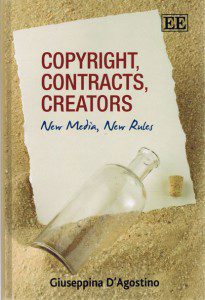Copy Rights and Wrongs
Untangling the legal knots among creators, owners and users: a Q & A with Giuseppina
From Playboy to the Financial Post, print publications are continuing to move onto the iPad. But as publishing platforms expand, the industry is finding “a new way to exploit work,” says Giuseppina D’Agostino, founding director of IP at Osgoode Hall Law School. She thinks we’ll be seeing more cases like freelancer Heather Robertson’s, who sued publishers Thomson Reuters Canada Lmtd. and CTV Globemedia Publishing Inc., for publishing her work on electronic databases without compensation or consent. Despite the eventual success of such cases, D’Agostino maintains lawsuits are not the way forward. Her solutions to publishers exploiting the ambiguity of copyright contracts can be found in her book,Copyright, Contracts, Creators: New Media, New Rules. Released in 2010, it evaluates the efficiency of current copyright law, with a specific focus on freelance journalists working in the digital world. 
Copyright issues surrounding digital media aren’t new. Why do you think your book has garnered so much attention now, years after some of these issues first arose?
While the issues are not new, they still haven’t made the mainstream discourse and debate, especially in Canada.
The forward to your book notes that how freelancers have fared under copyright law, and according to new technologies, is a neglected field of legal academic research. Why do you think that is?
In large part, an explanation is the owner-centric nature of the debates. You have owners against users, and the creators often get lost in that dichotomy. One thing users tend to do is they put creators and owners together as having the same interests, and therefore in opposition to theirs. I want to ensure that at the very least there’s a strong distinction.
How have you seen your book make a difference in these issues so far?
Well, number one, I was one of the first witnesses called on C-32 [Canada’s copyright modernization act]. So I have the attention of parliament – they saw it as important to invite me, because they saw that my perspective is different. Also, I think it’s galvanizing creator and author groups more. I’ve noticed since my book’s come out, there’s been so many more speaking invitations because there is more of a general interest in the community for a scholarly base on this issue. The Writer’s Union of Canada got together – and this is a solution I proposed – to come up with some best practices and guidelines. The proposal is still in discussions.
The final chapters in your book focus on the solutions you propose to amend copyright law and contracts. Can you tell me a bit about those solutions?
The law will set the tone and principle, but then there also has to be solutions outside of the law, so industry practices, guidelines, soft-law things.
How do guidelines and industry practices work in accordance with the law?
Guidelines don’t have the binding force of the law. What it does is it gives some clarity to the relations between authors and publishers, as to what the practices should be, and they do it in a user-friendly way. Try and read the copyright act, and see if you can make any sense of it. They set out to discourage certain types of behaviours, they encourage certain behaviours, and generally they set principles to enable and offer inexpensive and flexible solutions to facilitate contracting. So it’s pretty much like a law, but it’s made by the users themselves – the people, the citizens, the artists – that need clarity. A freelancer would have an understanding of what the basic rules of play and engagement are so at least they start from some position of power. Education is the number one thing.
You also address the history of copyright law in your book. How has it set the standard for what we’re seeing in the inefficiency of copyright law in today’s media landscape?
Well, the history is forgotten. What I would really like to see is an evaluation and an understanding of all of our practices. In the 1920’s when silent picture films became talkies, there was litigation, and even going back further than that, when you had the printing press, there was litigation. So often when there’s new technology, there were bubbles of disputes and litigation. That’s never going to go away, and I’m not saying it should, but at least have a mechanism in place in our law to be able to tackle those bubbles when they happen.
What kind of mechanism would help tackle copyright disputes?
One thing that I would really like – and this is a very basic thing – is a default rule that basically says any ambiguity in the contract should then favour the weaker party, which is the writer. So it gives the publisher incentive to specify clear terms, and it also addresses the fundamental issues between publishers and authors, which are information asymmetry and inferior bargaining power.
What about some of the more recent contracts, such as the one put out by Transcontinental in 2009, in which I think it’s pretty clear freelancers are giving up all of their rights when signing the contract?
That’s a good example. I think there there’s likely going to be litigation on that. There’s a good case for freelancers to sue them.
Even if they’ve signed the contract?
Even if they’ve signed it. Imagine, five or 10 years from now, there’s going to be a new means of technology, something else unimagined in the context of this time that is going to re-new different challenges, different means of exploitation, different sources of money. It’s unfair to assume that the freelancer would have wanted to give those rights up.
*Please note quotes have been edited for length.










































